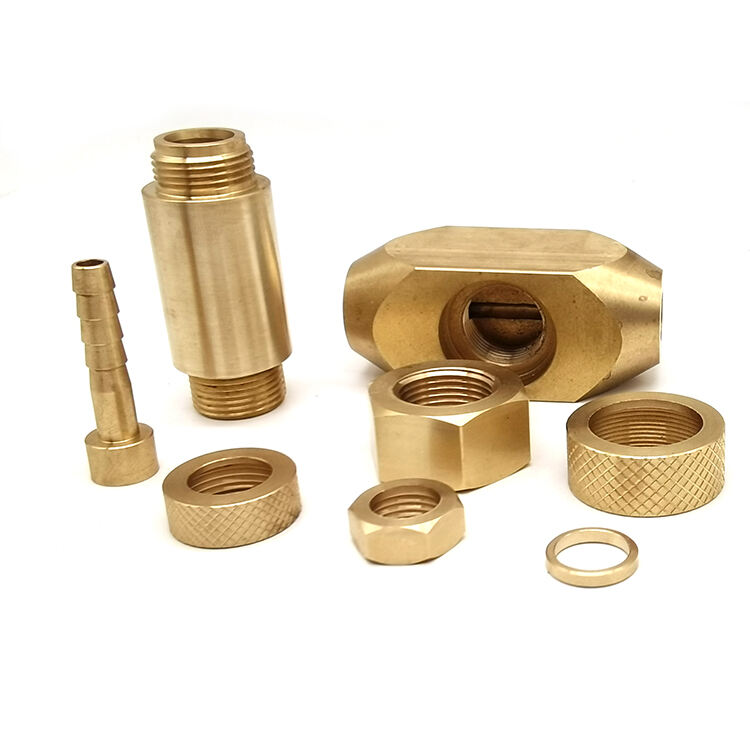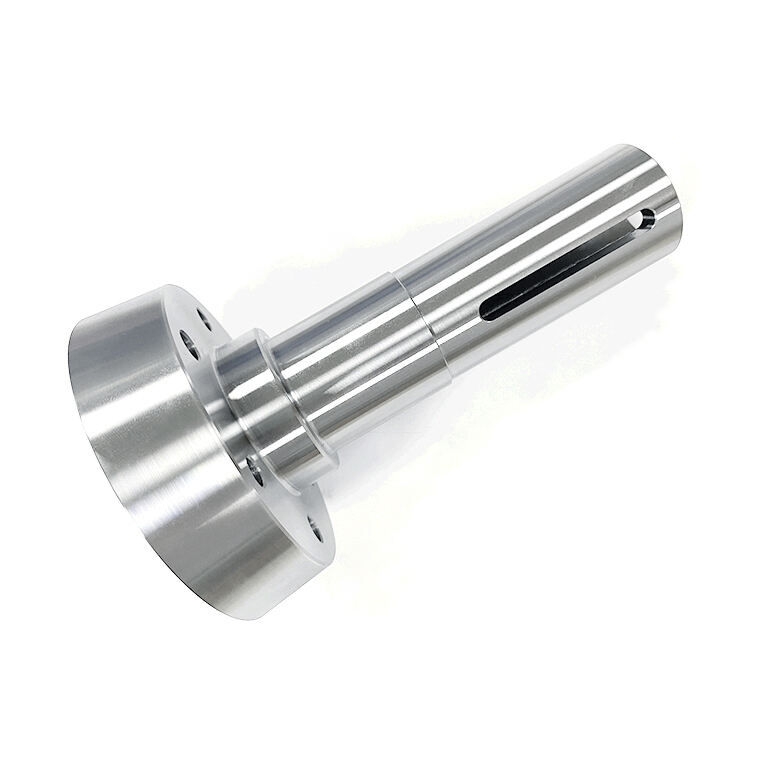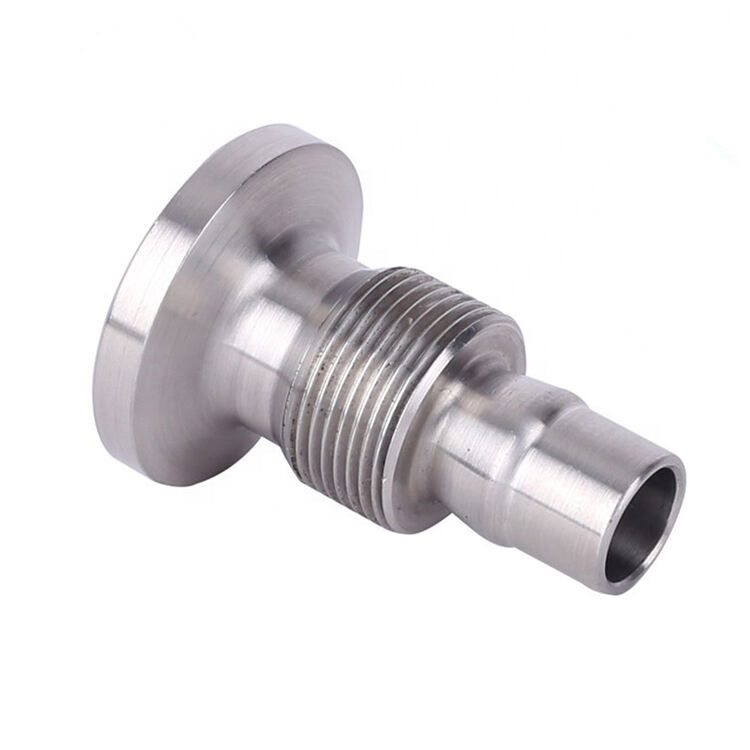Jan 10,2025
0
CNC gamyba, arba Kompiuterinio Skaitmeninio Valdymo Gamyba, transformuoja gamybą naudojant automatizuotus ir kompiuteriniu būdu valdomus įrankius, kad pagamintų sudėtingus detalės su aukšta tikslumu. Nors skiriasi nuo tradicinių rankinio tipo gamybos, CNC gamyba naudoja kompiuterius valdyti judėjimą ir operacijas naudojant mašininės įrangos įrenginius, leidžiantį gauti tikslumą ir efektyvumą gaminant komponentus įvairiose pramonės šakose.
Širdyje CNC gamybos yra principai, kurie leidžia gaminti sudėtingas geometrijas ir aukštos kokybės dalis. Procesas prasideda naudojant CAD (Kompiuterinė Pagalba Dizainui) programinę įrangą, leidžiančią sukurti išsamiuosius skaitmeninius dizainus. Tada šie dizainai yra konvertuojami į CAM (Kompiuterinė Pagalba Gamybai) programas, kurios paverčia dizainą į seriją instrukcijų, žinomą kaip G-kodas, kurį CNC mašina turi vykdyti.
CNC gamybos procesas vyksta kelis pagrindinius etapus:
Per kiekvieną iš šių etapų, CNC gamyba užtikrina aukštą pakartojamumo, greičio ir tikslumo lygį, dėl ko ji yra svarbus elementas modernioje gamyboje pramonėse, kurios reikalauja sudėtingų komponentų.
CNC mašinos sudaro įvairūs tipai, kuriuos taiko konkrečioms situacijoms skirtingose pramonėse. Trys pagrindiniai CNC mašinų tipai yra CNC grybmaišiai, CNC tornai ir CNC maršrutizatoriai.
Šių mašinų veikimo vertė didžiausiai priklauso nuo jų pagrindinių dalių: valymo jungiklio, įrankių sistemų ir valdymo sistemų. Valymo jungiklis nustato sukimosi greitį ir tikslumą, o įrankių sistema leidžia automatiškai keisti įrankius. Valdymo sistema, dažnai grindžiama išsamesnu programiniais įrankiais, užtikrina tikslų gamybos atitikimą projektavimo specifikacijoms.
Stiprumo, tikslumo ir stabilumo užtikrinimas CNC mašinose yra būtina siekiant geresnių gamybos rezultatų. Mašinos stiprumas mažina svyravimus, kurie gali paveikti gaminių kokybę. Aukštas tikslumas leidžia gaminti detalizuotus ir konsekventinius komponentus, kas yra būtina pramonėse, kuriose tikslumas yra neatsiejamas. Stabilumas prisideda prie ilgesnio mašinų naudojimo laiko ir sumažintų priežiūros pastangų, dėl ko CNC mašinos yra ekonomiškas investicijos variantas ilgą laiką.
Visuotinai, tinkamos CNC mašinos tipo pasirinkimas ir jos komponentų supratimas yra pagrindiniai etapai pramonei, siekiančiai maksimalios produktyvumo ir aukštos kokybės išvesties.
CNC gamybos paslaugos siūlo sutinkamas sprendimus įvairioms pramonėms, dėmesį skiriant tikslumui ir lankstumui. Pavyzdžiui, mūsų Pasirinktinė CNC gamybos paslauga tiksliai apdirbančioms auksinio ir varnio detalėms išskiriasi savo tiksliaja kokybės kontrolė ir asmeninių dizaino galimybių teikimu. Naudojant aukščiausios klasės auksinį ir varnį, ši paslauga užtikrina aukščiausio lygio tikslumas su mikronų lygiu tikslumu, atitinkančią konkrečias pramonės reikalavimus.

Kitas pasiūlymas, OEM gamintojas pasirinktinės CNC varno gamyba paslauga specializuojasi tokių tikslumo stalių plieno dalių gamyboje. Ji siūlo didelius privalumus gamyboje, nuo medžiagų, pavyzdžiui, 304 ir 316 stalių plieno, iki daugiakosminio gabenimo galimybių. Ši paslauga yra ideali kritiniams pramonės taikymams, kur kruopščios matmenų tikslumas ir integrybė yra būtinos.

Be to, Patobulinti Pasirinktiniai Stalių Plieno CNC Gabentieji Komponentai paslauga koncentruojasi ant išdrįstų, tiksliai suformuotų metalinių dalių gamybos. Šios komponentai yra sukurti aukštos našumo aplinkose, siūldamos patobulintą išdrįstumą ir griežtas tolerancijas, kurios yra būtinos pramonės naudojimui. Jos galima pritaikyti pagal projektų specifikacijas ir yra naudojamos automobilių, erdvinės technikos ir naftos/gazo pramonėse.

Šios paslaugos rodo įvairias CNC mikroformavimo galimybes tenkinti pramoninius poreikius. Sėkmingi praktiniai pavyzdžiai pabrėžia tikslumo efektyvumą, pvz., automobilių arba oro erdvinėje pramonėje, kur customizuoti CNC sprendimai prisidėjo prie produkto našumo pagerinimo ir išlaidų mažinimo. Tokios pažangos parodo CNC mikroformavimo transformacinį potencialą įvairiose sektoriuose.
CNC mikroformavimas siūlo nevienodų tikslumą ir tikslumą, dėl ko jis tampa populiariuoju pasirinkimu šiuolaikinėje gamyboje. Technologija gali pasiekti tolerancijas kaip ±0,001 colio, tikslumą, kuris viršija daugelį rankinio mikroformavimo technologijų. Pavyzdžiui, kosmoso komponentams dažnai reikalingi tokie griežti tolerancijos ribojimai, kad būtų užtikrinta, jog dalys derisi be jokių triučių, parodydami, kaip CNC mikroformavimas efektyviai atitinka šiuos griežtus standartus.
Efektyvumas ir greitis CNC mašinų teikia didelius privalumus palyginti su tradiciniais metodais. Į priešingu nei rankinės operacijos, CNC mašinos gali dirbti nepakitę 24/7, kas padidina gamybos tempą pagal didžiuotę. Pagal pramonės rodiklius, CNC mašinos gali sumažinti gamybos laiką iki 50% palyginti su rankinės gamybos būdu, leidžiant gamintojams atitikti aukštą paklausą trumpesniais terminais.
Vienas iš vertingiausių CNC gamybos aspektų yra jos daugialypumas apdorojant plačią medžiagų spektrą ir gamindama sudėtingas geometrijas. Ar kalbame apie metalus, plastikus ar junginius medžiagas, CNC mašinos gali sukurti sudėtingus formatus ir detalizuotus dizainus, kurie kitais būdais gali būti sudėtingi. Šis daugialypumas leidžia pramonei inovuoti ir gaminti pasirinktinus detales, atitinkančius specifinius dizaino reikalavimus.
Vienas didžiausias iššūkiai CNC gamyboje yra aukštas pradinis išlaidų lygis, susijęs su CNC technologijos įrenginių pirkimu ir įdiegimu. Verslui reikia atlikti didelę finansinę investiciją nuo pat pradžių, kurios gali kelti nuo 50 000 USD iki daugiau nei 500 000 USD, priklausomai nuo įrenginio sudėtingumo ir funkcionalumo. Nors CNC technologija siūlo ilgalaikes sąnaudų mažinimo galimybes ir efektyvumą, investicijų grąža gali labai skirtis atsižvelgiant į veiksnius, tokius kaip gamybos apimtis ir rinkos paklausa. Ši didelė finansinė terša gali būti pagrindinis kliūtis mažosioms ir vidutinio dydžio įmonėms, nagrinėjančioms CNC technologiją kaip operacinį patobulinimą.
Medžiagų ribotumas taip pat kelia iššūkius CNC gamyboje. nors CNC mašinos gali tvarkyti plačią medžiagų spektrą, kai kurios medžiagos, tokios kaip tam tikros keramikos ir kompozitai, gali būti sunkios apdoroti dėl jų tvirtumo ir skausmingumo. Taigi, tai riboja CNC gamybos verslumą pramonėse, kur reikalingos specializuotos medžiagos, reikalaujant alternatyvių gamybos technologijų ar specializuotų pataisymų, kad efektyviai spręstų šias problemas.
Be to, programuojant CNC mašinas, pateikiama savo rinkinys sudėtingumų ir įžambių klausimų. Operatoriai reikalauja jungties iš CNC programavimo kalbų, pavyzdžiui, G-Code ir M-Code, ekspertizės ir supratimo mašinų sudėtingumo. Klaidos programavime gali sukelti didelius laiko netikrumus, medžiagų išmetamumą ir galimą mašinos pavojų. Taigi, kvalifikuoti darbuotojai yra būtini ne tik tam, kad parašytų tikslius programas, bet ir tam, kad išspręstų problemas bei optimizuotų gamybos procesą. Šis specializuotųjų įgūdžių poreikis pabrėžia potencialią sudėtingumą ir laiko investicijas, kurios reikalingos efektyviai valdyti CNC technologijas.
Būsimasis CNC gamybos ateitis formuojama automatizacijos ir inteligentinių technologijų, pavyzdžiui, „Internet of Things“ (IoT), kurios skatina pažangą ir efektyvumą. IoT leidžia mašinoms tarpusavyje komunikuoti ir koordinuoti veiksmus, sumažindamos neveiklumo laiką ir padidindamos gamybos efektyvumą. Inteligentinės fabrikos naudoja šias technologijas, kad pagerintų tikslumą ir supaprastintų operacijas.
Dirbtinio intelekto (AI) ir mašininio mokymosi technologijos gali dar labiau transformuoti CNC procesus, stiprinant tikslumą ir efektyvumą. Šios technologijos gali prognozuoti mašinų apdovanojimo poreikius, optimizuoti pjovimo trajectorijas ir netgi mažinti klaidas, mokantis iš istorinių duomenų. Tai rezultuoja geriausiais rezultatais ir mažesniu atliekų kiekiu.
Sustainingumas taip pat tampa svarbiu dėmesio asmeniu CNC gamyboje. Gamintojai integruoja iniciatyvas, siekdami sumažinti atliekas ir energijos suvartojimą, pavyzdžiui, naudojant ramiau aplinkai palankias medžiagas ir perdirbant nekvalifikuotus medžiagų atliekas. Šie pastangos ne tik sprendžia ekologiškus klausimus, bet ir atitinka didėjančią paklausą po suderintų su sustatingumu gamybos metodų. Prisiimdamas šias tendencijas, CNC gamybos pramonė yra linkusi toliau vystytis, derinant efektyvumą su aplinkos atsakomybe.